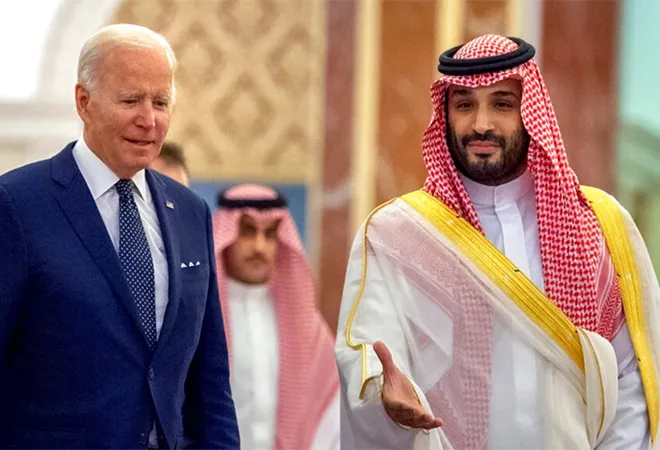-
CENTRES
Progammes & Centres
Location
Realpolitik may have trumped the Biden administration’s rather vocal positions on principles in the region

Although Mr. Biden made a veiled attempt to criticise the Saudi leader, the meeting’s focus on bilateral cooperation in 5G technology and integrated air defence, and the fact that Mr. Biden welcomed Saudi Arabia’s plan to strategically invest in projects aligning with U.S. Partnership for Global Infrastructure and Investment (PGII) goals, all point to Washington’s need more than Riyadh’s. Furthermore, the Crown Prince did not make any public commitment to increase oil production. With Saudi Arabia, Mr. Biden is perceived as having skirted critical issues in the bilateral relationship such as the release of political prisoners, clemency for opponents of the regime, and easing of travel restrictions, especially for those who hold dual citizenship in the two countries. However, two developments from Mr. Biden’s visit could result in positive externalities for the region: one, the consensus to sustain an UN-mediated truce in Yemen and two, the opening of Saudi airspace for civilian aircraft flying to and from Israel. The aim of the former is to translate the truce, which has led to 15 weeks of peace, into a durable ceasefire and political process between Yemen and Saudi Arabia, creating conducive grounds for development and aid in war-ravaged Yemen. The latter emboldens the spirit and objectives of regional bonhomie, which the U.S. sought through the Abraham Accords. The Biden administration has tried to add a different hue to the Abraham Accords by establishing the Negev Forum, following up from the Negev Summit held in March 2022.Mr. Biden’s trip to Saudi Arabia signalled a re-prioritisation of his administration’s interests, compelled by the Russia-Ukraine war and its ramifications on the global food and energy situation.
At the heart of Mr. Biden’s trip to West Asia lay the global energy situation, exacerbated by the conflict in Ukraine. There is a strong possibility that gas prices in the U.S. may surge as much as three times the current value before the U.S. midterm elections in November. As stricter Western sanctions on Russia kick in, Russia is expected to retaliate by even halting supplies to Europe ahead of the December 5 deadline set by European countries to fully ban Russian cargo ships carrying oil to Europe. Among the top priorities for the Biden administration during the visit to the region were to ensure predictability in energy supplies, stabilise energy prices, curb inflation, assure European allies of energy supplies before winter and convert these into domestic support for the Democrats in the midterm elections. As Russia has cut oil and gas supplies to European countries significantly, there is a new energy scramble in Europe which is characteristically both long and short term. In the short term, European countries such as Germany and Austria are bracing for a harsh winter amid limited energy supplies and possibly the threat of a total cut-off by Moscow. In the long term, the U.S. has led the Western effort to establish alternate energy supply routes to ensure energy security for Europe even amid limited Russian supplies. Mr. Biden’s trip to West Asia also saw several other meetings with heads of state as part of his meetings with Gulf Cooperation Council countries in Jeddah including Prime Minister Al-Kadhimi of Iraq; President of the UAE, Sheikh Mohammed bin Zayed; Egyptian President Abdel Fattah Al Sisi; Amir Sheikh Tamim Bin Hamad Al Thani of Qatar; King Hamad bin Isa Al Khalifa of Bahrain; and King Abdullah II of Jordan. Much in line with Mr. Biden’s visit to Saudi Arabia, his meetings with other regional leaders ended without any substantive breakthrough.As stricter Western sanctions on Russia kick in, Russia is expected to retaliate by even halting supplies to Europe ahead of the December 5 deadline set by European countries to fully ban Russian cargo ships carrying oil to Europe.
The I2U2, beyond its promises of integration, is of strategic value to the U.S. on the back of troop pull-out from Afghanistan, a not-so-favourable relationship with Saudi Arabia and a hostile relationship with Iran.
The views expressed above belong to the author(s). ORF research and analyses now available on Telegram! Click here to access our curated content — blogs, longforms and interviews.

Professor Harsh V. Pant is Vice President – Studies and Foreign Policy at Observer Research Foundation, New Delhi. He is a Professor of International Relations ...
Read More +
Vivek Mishra is Deputy Director – Strategic Studies Programme at the Observer Research Foundation. His work focuses on US foreign policy, domestic politics in the US, ...
Read More +